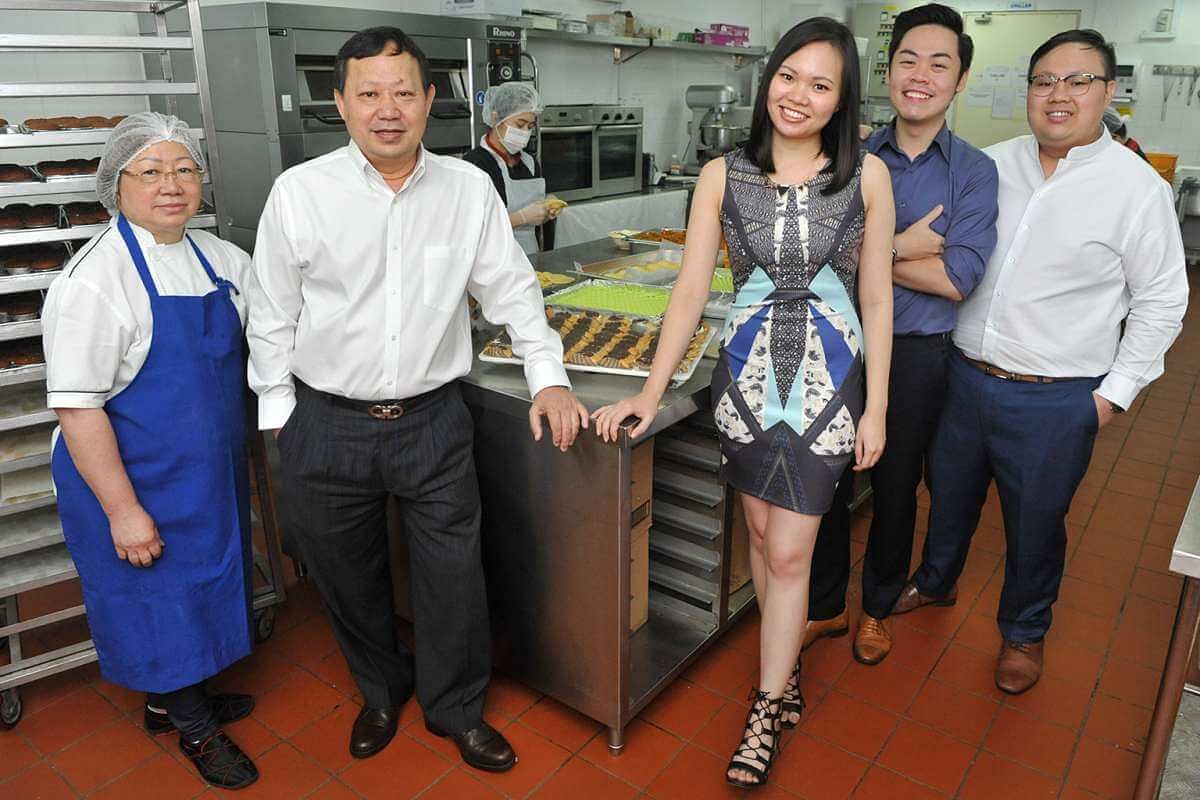Next generation family businesses
What does it take to run a family business? The Straits Times speaks to four companies whose business practices are being transformed by the next generation



A fresh twist to noodles
A home-grown company has launched Singapore's reportedly first fresh noodle meal kit, which can be kept for more than the usual two days at room temperature.
Using pasteurisation technology, siblings and directors Raymond and Annie Tan of noodle manufacturer Tan Seng Kee Foods have extended the shelf life of fresh noodles to 30 days at room temperature and up to six months under chilled conditions.
Launched in April, these microwaveable meal packs consist of preservative-free fresh noodles and a fresh spice mix. They are available in three flavours - Prawn Mee Soup, Curry Mee and Laksa - and retail at $2.95 each.
To serve, add room temperature water to the spice paste, mix well, then add the noodles. Microwave on high for four minutes and the meal is ready.
"There is no equivalent to this on the market at the moment," says Mr Tan, 44, who is married with two children.
Such innovative products show how far their family business has come since the siblings took over about 13 years ago.
The business began in 1936 with Mr Tan's grandfather selling beef noodles from a Neil Road shophouse. Realising that noodles were in great demand by immigrants from China, he soon started making kway teow by hand and supplied it to street vendors.
In 1969, Mr Tan's parents took over the business. The siblings recall spending their school holidays in a factory unit in Aljunied, helping their parents make and pack noodles.
Things moved steadily along, with the noodles being supplied to zi char and wet market stalls, and school canteen operators.
Then, in 2003, Mr Tan decided to ditch his power suit as a business development manager in the oil and gas industry to join the family business.
Two years later, his older sister, now 47, who had worked in the marketing and communications line for more than 20 years, joined him. They have three other siblings who are not involved in the business.
"My parents were in their late 60s by then. If no one took over, they would cease the business," he says.
The siblings have since grown the company from a noodle supplier employing eight people who made everything by hand, to a large-scale manufacturer and exporter of machine-made noodles with a staff strength of 40.
In 2003, Mr Tan moved the business out of the Aljunied premises to a larger space at Bedok North.
He also fully automated the laborious production process.
To increase its market share, he secured halal certification as well as Hazard Analysis Critical Control Points (HACCP) certification to ensure food safety.
Now, the noodles are distributed to restaurant chains, caterers and supermarkets.
The brand has also gone international, thanks largely to its investment in research and development into extending the shelf life of fresh noodles. The company hired a food scientist to do the research. A six- figure sum and 11/2 years of experimentation later, a new range of pasteurised fresh noodles was launched under a new retail brand, Kang Kang, in 2010.
Their brand mascot is a monkey. Kang Kang in Mandarin sounds like "healthy" and the playful monkey creates a cheerful image.
Ms Tan, who is married with two children, says of its happy, heart- shaped face: "Our noodles are made with love and we're happy to share what we love."
Because of the noodles' shelf life, Kang Kang products are easily exportable. They are sold in the United States, the Middle East, New Zealand and Holland. The company also participates in international food fairs to introduce the brand to new markets.
Mr Tan says the company has been enjoying double-digit growth figure every year since 2003.
While they have only just rolled out their fresh noodle meal kits, they are already experimenting with new varieties of noodles in addition to their stable of products, and new flavours such as a breakfast-friendly noodle and spice pack combination.
The siblings hope that their efforts have elevated the image of food manufacturers here and "dignified" the humble staple food.
"It is a low-value item, but we have the passion to innovate," says Mr Tan.
"Young people think eating pasta is cool, but eating fresh noodles is sexy and trendy too."
Getting organised in the Kitchen

They own catering firms Elsie's Kitchen and Continental Delight; the Flavours chain of three foodcourts; as well as a social arm called The Hesed Table that distributes food to migrant workers.
Mr Daniel Ang, 61, is the chief executive. He and four out of his seven other siblings are involved in the business.
The company was started by their parents in the 1950s, when they ran canteens at the British Royal Air Force camps.
After the British withdrew from Singapore in the 1960s, the Ang siblings ran snack bars and canteens under the name Elsie's Kitchen. Elsie is the name of Mr Ang's elder sister, who is the third oldest in the family.
In 1990, they ventured into event catering, running their business from a 2,000 sq ft shophouse in Serangoon Garden.
By 2012, they had expanded to neighbouring shophouse units and had a working space of 15,000 sq ft.
It was at this point that the next generation took over the mantle.
Mr Ang's son, Reuben, 29, became managing director of catering company Elsie's Kitchen in 2012.
That same year, his sister, Rachel, 30, quit her job as a special needs behavioural therapist to become the company's human resource director.
Their cousin, Job, 27, came on board last year as director of food and beverage.
Together, the new generation started a programme of corporatisation and consolidation.
Reuben set up a new parent company called Hesed & Emet to house all the brands.
In Hebrew, Hesed means love, mercy and kindness, while Emet means truth and integrity - the name is a nod to their Christian faith.
Gone are the days when Elsie's Kitchen, which specialises in Singapore fare such as nasi lemak and chicken rendang, was run like a mom-and-pop store.
Before Reuben joined, bookkeeping was done manually and stacks of cash lay in plain sight.
He says: "Cash flow consisted of the directors receiving payment in one pocket and making payments from the other. Things had to change."
The company's operations shifted from Serangoon Garden to a spanking new 57,000 sq ft facility at 21 Second Chin Bee Road in Jurong Industrial Estate.
There, Reuben put in place a proper reporting structure and cashiering system and marketing teams.
In 2013, Hesed acquired Continental Delight, another catering company, which specialises in fusion food.
Reuben then spearheaded a rebranding exercise for Elsie's Kitchen and Continental Delight. The brands now have updated menus, new logos and clearer positioning.
He is experimenting with new dishes for the catering firms, and grab-and-go meals are in the works.
The Angs say disagreements are few in the family business.
Rachel says: "There's a lot of hard work when you work for the family. We can't go for family holidays together, we don't get days off and we work even when we're sick.
"But we enjoy doing this because we are all driven by passion."
Expanding from buses to planes and more

True to its name, BusAds started out as a company that specialised in bus advertisements.
Set up by Mr Matthew Yapp, 69, in 1983, it provided handpainted advertisements to be stuck on the sides of buses and, over the years, moved into producing decals.
But since Mr Yapp's son, Alvin, joined the family business as director of corporate affairs in 2003, it has expanded beyond sticking advertisements on buses - to the point that its name may become a misnomer.
Now, BusAds covers different aspects of outdoor advertising. It does work on bus shelters, trains, taxis, ships and aeroplanes.
Besides decals, it makes 3D advertisements and interactive light boxes. It is also the only company approved by the Civil Aviation Authority of Singapore to paste decals on aeroplanes.
BusAds is also involved in eye- catching, creative campaigns.
In 2008, it set up a bus-shelter advertisement for Colgate's anti- cavity toothpaste. Hundreds of ants were released into an ant farm in the bus-stop display, digging tunnels through gel, thus creating the image of a tooth with cavities. This was recognised by the Guinness World Records for being the largest ant farm habitat in Singapore.
BusAds also produced the "trick art" decals at Westgate shopping mall. Trick art uses optical illusions to make 2D images look 3D and visitors end up looking like part of the creation when photographed with the exhibit.
In 2014, the company won the Gold Award at the prestigious Asian Print Awards, which recognises outstanding achievement in the print and packaging industries across Asia. This was for installing a decal underwater - in a swimming pool - without having to first drain the pool.
This innovative spirit is the work of Mr Alvin Yapp, 46. His promise to clients is: "You dream and we will make things happen for you."
Before joining BusAds, he had been living and working abroad in Bangladesh as a station manager overseeing airport operations for Singapore Airlines.
He decided to return to the family business because he knew his only sister, 41, who was then working in the firm's sales team, would stop working once she had children. He was right.
His father let him start by handling the production matters.
"That's where all the problems were," he says. "Customers would complain about everything, from decals not being pasted properly - air bubbles, not straight, upside down - to workers arriving late for the job."
He dealt with these issues by organising weekly meetings for production workers to run through the work of the past week and to give feedback. The company hires 40 people.
He also revamped his company's annual dinner as part of a strategy to boost morale and arrest attrition.
No longer just "a small makan session", these now come with lucky draws, games and performances. "After all, it's people who make the company," he says.
Pop of new flavours

Her father, Mr William Chin, founded Straits Union Holdings in 1971. The company is one of the largest importers of popcornmaking machines and ingredients, as well as nacho chips and cheese, and candy floss sugar.
It supplies to 17 cinema outlets here, including Shaw, Cathay, Eng Wah and Filmgarde; hotels; and event organisers.
Mr Chin was 74 when he died from complications arising from pneumonia. He is survived by two children, Elaine, who had been living abroad for more than 10 years and was then based in China as the director of public relations in a hotel, and Kenneth, 39, who is selfemployed and has no interest in joining the family business.
His death left his daughter in shock and grief. But she knew she had to "be strong" for her mother, Helen, 68.
So the bachelorette moved home. Her father's trusty secretary, Ms Katherine Chok, 64, held the fort while she deliberated over what to do about Straits Union.
After visiting customers who shared stories about her "lovable, jolly" father and their disappointment that the company had no successor, Ms Chan's path became clear by July last year.
Roping in her mother to take care of the company's finances, she came up with a business plan.
She started a website and Facebook page for the company, which has eight staff, and continued talking to her father's customers and suppliers - South Africa-based corn producer Biggi Brands and United States-based manufacturer Gold Medal Products.
Since coming on board, she has introduced more than 10 popcorn flavours not readily available here, including garlic parmesan, pina colada and jalapeno.
She is also working with event organisers and individuals who want to develop unique popcorn flavours and their own gourmet labels.
Also in the pipeline is microwaveable popcorn in flavours such as sour cream and chives and salt and vinegar, which she hopes to introduce to supermarkets here, which typically carry sweet or salty flavours.
Since she joined, she says the company has grown in terms of its client base and has seen a 65 per cent increase in the import volume of popcorn, caramel and nachos ingredients.
"One step at a time, things are happening," she says.
"This is my father's legacy. By making sure that the company continues to grow healthily, I know I'm making him proud."
Join ST's Telegram channel and get the latest breaking news delivered to you.
A version of this article appeared in the print edition of The Sunday Times on June 12, 2016, with the headline Next generation family businesses. Subscribe

